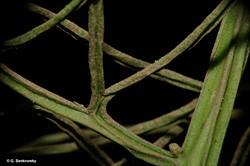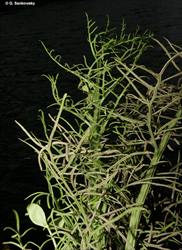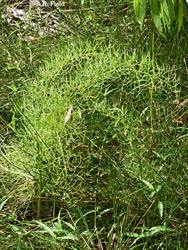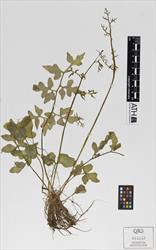Pteridaceae
Australian Tropical Ferns and Lycophytes - Online edition
Ceratopteris thalictroides




Ceratopteris thalictroides (L.) Brongn.
Link to Australian Plant Name Index for publication details and synonyms: https://id.biodiversity.org.au/name/apni/60157
Aquatic or semi-aquatic; roots arising from near the base of the stipe. Rhizome reduced, erect, sparsely scaly. Stipes tufted. Fronds dimorphic, succulent and brittle; veins anastomosing, without free included veinlets. Sterile fronds erect or spreading; stipe c. 2–30 cm long; lamina commonly 1–3-pinnate, ovate, more rarely broadly triangular, 4–40 cm long, 1–20 cm wide; pinna segments oblong to irregularly shaped, to 5 mm wide in larger fronds; buds often present in pinna-sinuses but mostly dormant on living fronds. Fertile fronds erect; lamina commonly 3–4 (–6)-pinnate, 2-pinnate above, ovate to broadly triangular, commonly 5–65 cm long, 4–30 cm wide; segments ±linear; margins recurved enclosing 1–3 rows of sporangia, Sporangia globose, not grouped into sori but borne singly along the veins, thin-walled, nearly sessile; annulus irregular (±absent in one non-Australian species). Spores 70–150 µm diam., tetrahedral-globose, trilete, ridged, 32; equatorial flange lacking.
Widespread across tropical and subtropical WA, NT and QLD. Widespread throughout the Palaeotropics.
Aquatic or terrestrial bordering wetlands. Usually in open woodland in sunlit areas.
This aquatic fern dies down in dry periods and grows back rapidly when re-submerged.
Readily cultivated in a pond or aquarium in bright light.
Field AR, Quinn CJ, Zich FA (2022) Australian Tropical Ferns and Lycophytes. apps.lucidcentral.org/fern/text/intro/index.htm (accessed online INSERT DATE).
Field AR, Quinn CJ, Zich FA (2022) ‘Platycerium superbum’, in Australian Tropical Ferns and Lycophytes. apps.lucidcentral.org/fern/text/entities/platycerium_superbum.htm (accessed online INSERT DATE).







